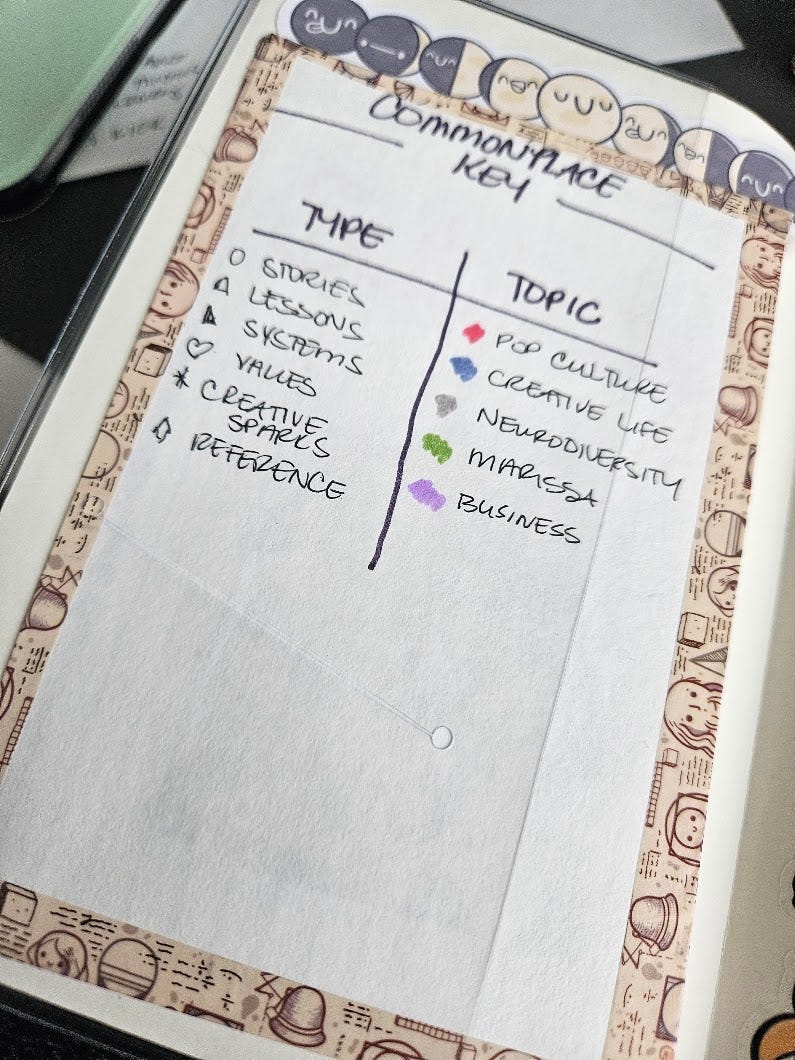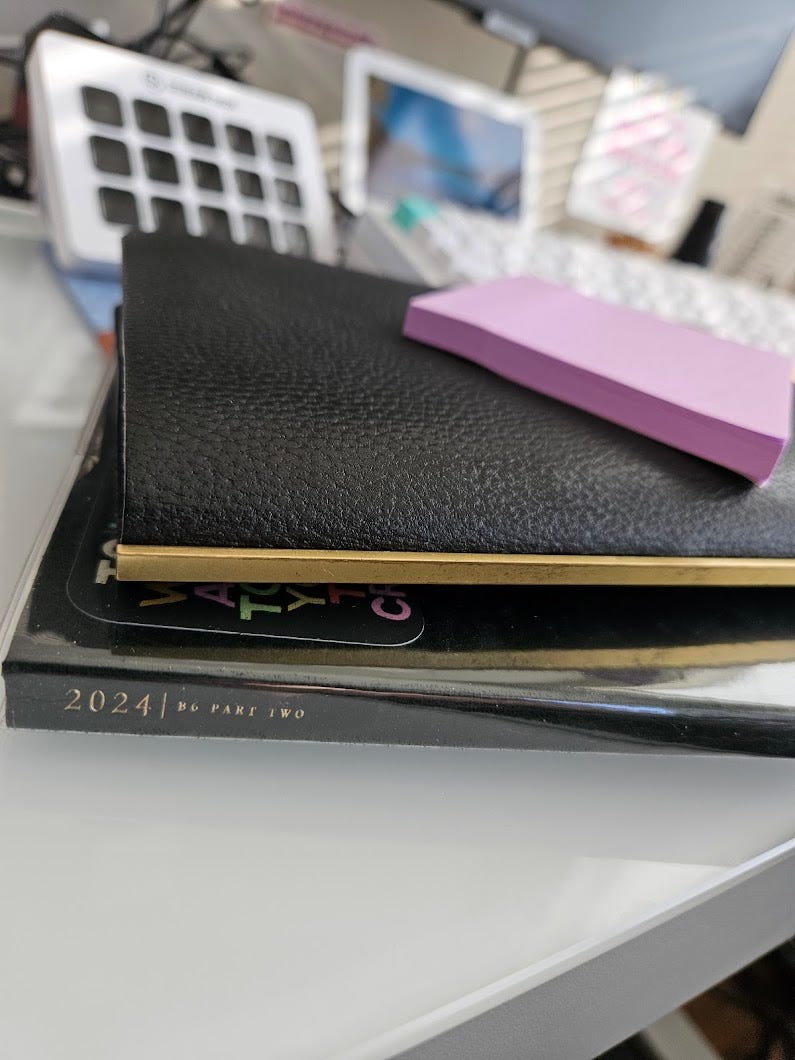Tending Your Digital Knowledge Garden
Marissa Garza on commonplacing to counter overwhelm in the digital age

Creative work is never short on chaos, between deadlines and overlapping projects, but there’s a specific ache to ideas half-held. The quote that sparked . . . something. That article (or one of many) you meant to return to. A thought scribbled on the back of a receipt, now lost between dimensions in a pocket.
It might feel like clutter, but Marissa Garza, creative systems magic-maker, is here to assure us that there’s no shame in all this. It’s not that we’re distracted or careless — we just need a place to put our thoughts.
In this resonant guest post, Marissa offers a gentle framework for what to do with our teetering stacks of inspiration. Drawing from historical practice and personal experience, she introduces a way of collecting and engaging with ideas that doesn’t ask you to be more productive, just more present. If you’ve been craving a slower, more meaningful way to stay connected to what moves you, this is a beautiful place to begin.
Tending Your Digital Knowledge Garden
A Personal Approach to Information That Matters

Last Tuesday night, I found myself staring at yet another browser window with 47 open tabs. Articles I'd meant to read, podcasts with insights I didn't want to lose, research for that project still simmering on my back burner. My digital life: sprawling, tender, and totally untamed.
Maybe you know this feeling. That quiet ache of encountering truly meaningful ideas but watching them slip through your fingers like water. The tabs aren’t just clutter—they’re traces of care. Proof you’re paying attention, even if it feels like you’re falling behind.
Hi, I'm Marissa. I help mission-driven creatives build systems that don’t stifle their ideas, but support their thinking. After years of experimenting with different ways to capture what resonates, I've come to believe: the problem isn’t abundance. It’s absence—the absence of a system that honors what matters to you.
The Ancient Art of Gathering Wisdom
What I didn't realize during those notebook-filling years was that I was participating in a practice with roots stretching back to antiquity. Long before digital overload, thoughtful humans were wrestling with how to capture and make meaning from the ideas they encountered.
Commonplacing began in ancient Greece and Rome, where philosophers like Seneca would keep personal notebooks of quotations and reflections as intellectual toolboxes. The practice evolved through the Middle Ages but truly flourished during the Renaissance when the printing press created what was perhaps the first "information explosion" in human history.
As books became more accessible, scholars needed systems to make sense of all this new knowledge. Renaissance humanists like Erasmus advocated for commonplace books as memory aids. By the 17th century, the practice had become so essential that philosopher John Locke developed a specific indexing method for organizing these personal knowledge collections.
What fascinates me most is how democratic the practice eventually became. While early commonplace books were primarily maintained by educated men who wrote their indexes in Latin, by the 18th and 19th centuries, the practice had spread widely. Women kept household commonplace books that captured not just literary passages but medical remedies and scientific observations. Writers from Milton to Emerson to Virginia Woolf maintained commonplace books that helped shape their thinking.
In many ways, we're not facing a new problem—we're experiencing an ancient challenge at unprecedented scale.
Finding Our Way Back to What Matters
Here's what I've learned in my journey from information overwhelm to intentional curation: the problem isn't abundance. It's absence—the absence of a system that honors what resonates instead of trying to capture everything.
This is where the ancient practice of commonplacing enters our modern story.
Commonplacing isn’t just another productivity hack—it’s a relationship with ideas. At its heart, it’s about creating a dedicated space for the thoughts, quotes, and insights that actually matter to you. It's your personal knowledge garden, where ideas aren’t just stored but allowed to grow, connect, and bloom into something uniquely yours.
Unlike passive scrolling that leaves no footprints in the sand, commonplacing offers:
A canvas where seemingly unrelated ideas can discover each other
Relief from the exhaustion of trying to remember everything important
A pathway from consuming other people’s thoughts to cultivating your own
A personalized library that becomes more valuable with each entry
Commonplacing isn't about optimization. It's about reclaiming agency.
Not Another System—A Companion
The template I’m sharing today emerged from my own messy process of trial and error. It's built on the belief that the best systems feel less like rigid structures and more like faithful companions—supporting your thinking without forcing it into uncomfortable shapes.
Here’s what makes this approach different:
1. The Database
A flexible space that captures not just the words that moved you, but your dialogue with them:
The quote or idea that sparked something in you
Where you encountered it (because context matters)
Your personal response: what it stirred, questioned, or confirmed
How it might connect to other threads in your thinking
Tags that help you find it again when you need it most
2. Contextual Tagging That Mirrors Your Mind
Instead of forcing ideas into rigid folders, this system uses multidimensional tagging:
Topic tags for subject matter
Project tags for connecting ideas to what you're creating
Insight tags for modes of thinking (reflection, strategy, process)
Source tags for tracking your influences
3. The Connection Dashboard—Where Magic Happens
The heart of the system: a visual space where you can
Watch patterns emerge across different sources and times
Draw lines between ideas that might have remained strangers
Discover surprising relationships that spark new thinking
Plant seeds for projects based on naturally emerging themes
The Gentle Art of Making It Stick
Let me be real: I've abandoned more systems than I care to admit. What makes this one different is its forgiveness. There’s no falling behind, no perfect way to use it.
I started with handwritten notes, setting aside Sunday mornings to transfer what caught my attention that week. A client captures insights directly into her digital template while reading. Another voice-records thoughts while walking and transcribes them later.
What matters isn’t the method—it’s the meaning. The system that survives is the one that feels like coming home, not another item on your to-do list.
Three patterns I've noticed in folks who sustain this practice:
Dedicated harvesting rituals – Gentle containers of time to review and reflect
Deliberate connection-making – Looking for conversations between new and old ideas
Creation as the destination – Using the commonplace as soil, not just storage
From Tabs to Trust
This isn’t about managing information. It’s about transforming your relationship with ideas.
In my work with writers, researchers, and mission-driven creatives, this shift often marks the moment when clarity starts to surface—when the noise quiets just enough to hear your own voice again.
So here’s your gentle invitation: Don’t worry about catching up. Just begin. What’s one idea you’ve encountered recently that you don’t want to lose?
That’s where your commonplace begins.
Making It Yours
This template is an invitation, not a prescription. It’s deliberately designed with space for your fingerprints. A few adaptations I’ve seen breathe new life into the structure:
For storytellers: Capture dialogue snippets, character moments, and mood details
For researchers: Highlight findings and frameworks that shape your questions
For consultants: Track client language and patterns that lead to breakthroughs
For content creators: Organize by audience needs and evolving themes
Let it evolve with you—not a tool you use, but an extension of how you think.
Want to try it out for yourself? Here's the template I built from my own messy learning curve:
A Final Word
In digital landscapes designed to hijack your attention, commonplacing offers something subversive: a place to listen. To gather what moves you. To respond, reflect, and remember.
This isn’t about becoming someone new. It’s about making space for the brilliance that’s already here—just scattered across a few too many tabs.
May your ideas have a home. May your thinking feel like yours again.
—Marissa
If this kind of gentle system-thinking resonates with you, I’d love to keep the conversation going. I write about creative rhythms, meaning-making, and building systems that feel like home over on my Substack.
Do you want to share an essay about the creative life on Work(ing) in Progress? Send me message, leave me a comment, or email me at hello@wordsbypriscilla.com — I’d love to see your words here.
Work(ing) in Progress schedule
Sunday 5/25, 12 pm PT/2 pm CT/3 pm ET, Prompt Potluck: share a prompt, write to a prompt, and clear some creative clutter
Wednesday 6/4, 4:30 pm PT/6:30 pm CT/7:30 pm ET, WIP Wednesday: a reminder to pick up that project you’re “working on” but haven’t touched in ages (no judgment, just time with your words)
Tuesday 6/17, 5 pm PT/7 pm CT/8 pm ET, Worth Another Look: self-revision strategies and workspace
Work(ing) in Progress events are free to paid subscribers and Wildflower🌻 members! Upgrade to paid now or grab a ticket to the sessions you want to join.








I really love this idea - making meaning and finding connections over time... this is definitely the way my mind works, having multiple tabs open, capturing little snippets of inspiration... and it was beautiful to see it given structure and process and value. Thank you!